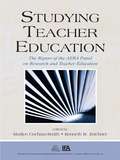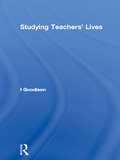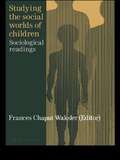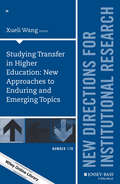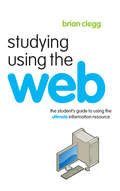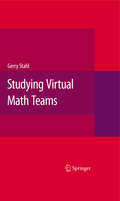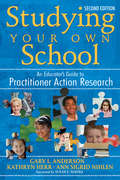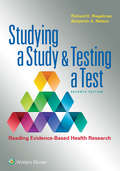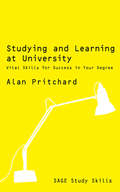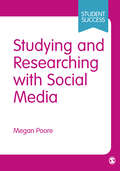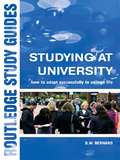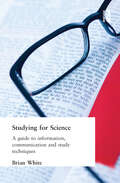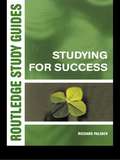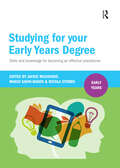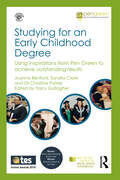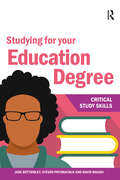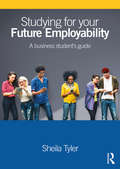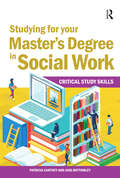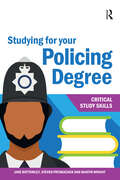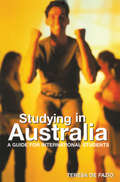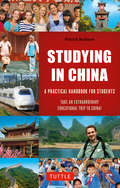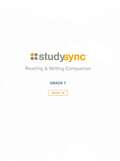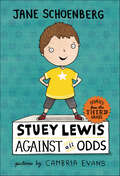- Table View
- List View
Studying Teacher Education: The Report of the AERA Panel on Research and Teacher Education
by Marilyn Cochran-Smith Kenneth M. ZeichnerPublished for the American Educational Research Association by Routledge This landmark volume presents the work of the American Educational Research Association's Panel on Research and Teacher Education. It represents a systematic effort to apply a common set of scholarly lenses to a range of important topics in teacher education.The Panel's charge was twofold:*to create for the larger educational research community a thorough, rigorous, and even-handed analysis of the empirical research evidence relevant to major policies and practices in pre-service teacher education in the U.S., and*to propose a research agenda related to teacher education that builds on what is already known and that identifies the research directions that are most promising for the future.Members of the Panel were appointed from various sectors of the educational research community and with different areas of expertise, including teacher education, policy, assessment, research design and methods, liberal arts, multicultural education, and school reform. Building on their diverse perspectives, they ably translated their charge into a series of questions that became the framework for this volume. The questions illuminate many of the issues that have been most contested in past and current discourse about teacher education reform. Studying Teacher Education examines research about the current pool of prospective and entering teachers and about local, institutional, state, and federal preservice teacher education policies and practices. The book includes three general chapters and nine research syntheses.*The AERA Panel on Research and Teacher Education: Context and Goals*Researching Teacher Education in Changing Times: Politics and Paradigms*Teacher Characteristics: Research on the Demographic Profile*Teacher Characteristics: Research on the Indicators of Quality*Research on the Effects of Coursework in the Arts and Sciences and in the Foundations of Education*Research on Methods Courses and Field Experiences*Research on Pedagogical Approaches in Teacher Education*Research on Preparing Teachers for Diverse Populations*Research on Preparing Teachers to Work with Students with Disabilities*Research on Accountability Processes in Teacher Education*Research on Teacher Education Programs*A Research Agenda for Teacher EducationEach chapter reviews the empirical literature and proposes a research agenda that builds on and extends what is known about a topic. A chart at the end of each chapter provides summary information for each of the empirical studies synthesized and two reference lists--one for all of the studies reviewed in the chapter and one for additional references used. The volume includes an introductory chapter on the Panel's context and goals, and an accessible Executive Summary of the book as a whole.Studying Teacher Education: The Report of the AERA Panel on Research and Teacher Education is a timely, indispensable reference for all researchers and professionals in the field.
Studying Teachers' Lives (Investigating Schooling Series #1)
by I GoodisonTo develop a mode of educational research which speaks both of and to the teacher we require more study of the lives of teachers. This book provides a vital insight into the ways in which teachers' bakgrounds and career histories affect their teaching methods and approaches. Many issues are covered ranging from the question of teacher drop-out to the importance of teacher socialisation. The studies employ a range of different methodologies allowing the reader to assess their varying strengths and weaknesses, but throughout they reaffirm the centrality of the teacher in educational research.
Studying The Social Worlds Of Children: Sociological Readings
by Frances Chaput WakslerFirst published in 1991. Routledge is an imprint of Taylor & Francis, an informa company.
Studying Transfer in Higher Education: New Directions for Institutional Research, Number 170 (J-B IR Single Issue Institutional Research)
by Gloria Crisp John F. RyanGain fresh perspectives and approaches to the topic of students transferring among institutions of higher education. Despite the copious research on transfer patterns and students who transfer, this line of research is thronged with conceptual, methodological, and data challenges that warrant continued and more nuanced attention. This volume answers this call and provides updated scholarship and examines emerging issues pertaining to transfer.Organized around two broad, interconnected ways to conceptualize transfer, it first examines students who transfer and then discusses transfer as a complex postsecondary pathway. Engaging empirical research, perspectives, and case analysis from higher education scholars and institutional researchers, this volume offers renewed conceptual and methodological insights that inform future research on transfer, along with concrete recommendations for institutional researchers. This is the 170th volume of this Jossey-Bass quarterly report series. Timely and comprehensive, New Directions for Institutional Research provides planners and administrators in all types of academic institutions with guidelines in such areas as resource coordination, information analysis, program evaluation, and institutional management.
Studying Using the Web: The Student's Guide to Using the Ultimate Information Resource
by Brian CleggAnyone can type a few keywords into a search engine. But that’s only the beginning. With Studying Using the Web you can find the right material, check its authenticity, transform it into your own original work and keep up-to-date on essential topics. The book is about how to find the right information, and making the most of it. It shows you how to: know what to look for make the best use of search facilities gather pictures, sounds and more make use of the human side of the internet learn how to test information with a trust CSI kit collect and structure your information effectively make text your own keep up to date. You could stay jogging round the information track. But think how much better you could do with the right technology and skills to harness a leading-edge study machine. Move into the study fast track now.
Studying Virtual Math Teams
by Gerry StahlStudying Virtual Math Teams centers on detailed empirical studies of how students in small online groups make sense of math issues and how they solve problems by making meaning together. These studies are woven together with materials that describe the online environment and pedagogical orientation, as well as reflections on the theoretical implications of the findings in the studies. The nature of group cognition and shared meaning making in collaborative learning is a foundational research issue in CSCL. More generally, the theme of sense making is a central topic in information science. While many authors allude to these topics, few have provided this kind of detailed analysis of the mechanisms of intersubjective meaning making. This book presents a coherent research agenda that has been pursued by the author and his research group. The book opens with descriptions of the project and its methodology, as well as situating this research in the past and present context of the CSCL research field. The core research team then presents five concrete analyses of group interactions in different phases of the Virtual Math Teams research project. These chapters are followed by several studies by international collaborators, discussing the group discourse, the software affordances and alternative representations of the interaction, all using data from the VMT project. The concluding chapters address implications for the theory of group cognition and for the methodology of the learning sciences. In addition to substantial introductory and concluding chapters, this important new book includes analyses based upon the author's previous research, thereby providing smooth continuity and an engaging flow that follows the progression of the research. The VMT project has dual goals: (a) to provide a source of experience and data for practical and theoretical explorations of group knowledge building and (b) to develop an effective online environment and educational service for collaborative learning of mathematics. Studying Virtual Math Teams reflects these twin orientations, reviewing the intertwined aims and development of a rigorous science of small-group cognition and a Web 2.0 educational math service. It documents the kinds of interactional methods that small groups use to explore math issues and provides a glimpse into the potential of online interaction to promote productive math discourse.
Studying Your Own School: An Educator's Guide to Practitioner Action Research
by Gary Anderson Dr Kathryn G. Herr Ann S. NihlenExtensively revised, this new edition provides the theoretical underpinnings of practitioner action research as well as the "how-to" information necessary for classroom application.
Studying a Study and Testing a Test: How To Read The Medical Literature (Core Handbook Series In Pediatrics Ser.)
by Richard K. RiegelmanThis complete package of textbook, interactive exercises, and real research articles is designed for use alongside Journal Clubs conducted in medical, nursing, and other health professions programs, as well as in evidence-based medicine courses. It employs the authors’ proven, step-by-step framework, and strengthens students’ and residents’ ability to recognize a meaningful study, identify potential study flaws, and apply solid evidence in clinical decision making. Class tested by students in leading medical schools, Studying a Study and Testing a Test, Seventh Edition, features a suite of resources ideal for traditional learning, flipped-classroom approaches, and distance learning:
Studying and Learning at University: Vital Skills for Success in Your Degree (SAGE Study Skills Series)
by Mr Alan PritchardStudying and Learning at University provides a concise and accessible introduction to the essential study skills for first-time undergraduates. Alan Pritchard focuses on the skills that every student will need to master to achieve succeess in their academic career. Practical, straight-forward advice is provided on subjects such as how to: - approach learning - use active reading techniques - use computers and the internet to support academic study - prepare for written assessment - prepare and deliver presentations. This guide is essential reading for anyone new to study at undergraduate level. Students setting out on any undergraduate course will welcome the support and guideance provided here. SAGE Study Skills are essential study guides for students of all levels. From how to write great essays and succeeding at university, to writing your undergraduate dissertation and doing postgraduate research, SAGE Study Skills help you get the best from your time at university.
Studying and Researching with Social Media (Student Success)
by Megan PooreWondering what your lecturers are looking for in a blog post? Asking yourself how that’s different from writing an essay (or a wiki page)? Unsure if Twitter really can be used to build your online profile as a researcher? If you want – or need – to integrate social media tools into your studies and research, this practical book is your one-stop shop. Megan Poore shares the secrets of how to harness the power of social media tools to improve your academic productivity. Inside, you’ll find out how to: ... write a good blog post ... contribute to a wiki ... maximise your grades when creating an audio-visual presentation ... find and share the latest research via Twitter ... keep safe online. Featuring handy illustrations and exercises, as well as guidance on broader issues such as copyright, avoiding plagiarism, and cyberbullying, you’ll find out all you need to successfully use social media to support your study and research. Visit the Studying and Researching with Social Media blog which accompanies the book, sharing tips and guidance on using social media to improve your study and research skills. The Student Success series are essential guides for students of all levels. From how to think critically and write great essays to planning your dream career, the Student Success series helps you study smarter and get the best from your time at university. Visit the SAGE Study Skills hub for tips and resources for study success!
Studying at University: How to Adapt Successfully to College Life (Routledge Study Guides Ser.)
by G. W. BernardStudying at University is an essential guide for anyone wanting to know how they can make the very best of their university experience. This highly informative book offers guidance to those in sixth form and college on what universities are all about and what being a student actually involves. The author also offers sensible advice to new and existing students on how they should set about their studies. Key topics include: choosing the university that is best for you preparing yourself for university life how and why universities are so different from school how to get the most out of lectures and seminars preparing and writing essays and assignments revising for exams and exam technique. Written by a university lecturer with vast experience of speaking to students about this nerve-wracking process, this engaging and accessible book is an indispensable companion for anyone who wants their move into higher education to be as informed and stress-free as possible.
Studying for Science: A Guide to Information, Communication and Study Techniques
by E. B. WhiteThis is a user-friendly guide for the science student to the location and use of the various forms of scientific information, methods of study and revision, essay and report writing, practicals and project presentation. The changes in requirements of science syllabuses mean that more emphasis is now placed on the student-centered learning; the topics covered in this study guide reflect those needs.
Studying for Success
by Richard PalmerThis lively and stimulating book offers an enlightening new approach to effective study. Without minimising the importance of good organisation and hard work, the author stresses throughout that study must and can be fun. Delivered with characteristic humour and wisdom, Richard Palmer updates and reinvigorates a classic, best-selling book with new sections on computers and the internet, as well as chapters covering important areas such as: memory and review essay planning and writing note-taking time management using resources exam techniques and preparation. This is an inspiring, essential read for all students studying for A Levels and undergraduate degrees who want to find the key to achieving success both in coursework and exams.
Studying for Your Early Years Degree: Skills and knowledge for becoming an effective early years practitioner (Early Years)
by Jackie Musgrave Maggi Savin-Baden Nicola StobbsA ONE STOP SHOP of accessible information for all early years students to help you succeed in your degree, increase your employability skills and develop as an ethical and critically reflective practitioner.Part one gives guidance for students about learning in HE specifically in the context of early childhood education and care, including course requirements, academic skills and core knowledge. Chapters cover students’ roles and responsibilities, safeguarding, understanding policy, and professionalism and ethical practice. The second part of the book looks explicitly at applying this knowledge and understanding in the workplace before tackling the final research project.
Studying for an Early Childhood Degree: Using Inspirations from the Pen Green Students to Achieve Outstanding Results (Pen Green Books for Early Years Educators)
by Christine Parker Tracy Gallagher Joanne Benford Sandra ClareStudying for an Early Childhood Degree, based on the practices of The Pen Green Centre for children and families, exemplifies how student-practitioners can foster strong communities of learners and create student-teacher connections that remain long after studies are complete. The Pen Green Integrated Centre in Corby, UK, has developed a unique approach to adult education. Highly qualified tutors, with their wide-ranging experiences, have written Studying for an Early Childhood Degree in collaboration with current and former students. It illustrates different ways to complete assignments, providing 20 case-studies of work that achieved an excellent grade from students of different professional, geographical, ethnic, educational and socio-economic backgrounds; it also explores the rationale behind what contributed to these excellent final grades. Each chapter, linked to the key themes of the Quality Assurance Agency (QAA) Early Childhood Studies degree, includes discussions, reflections, commentary and extracts from students’ works through Levels 4-7, as well as suggestions for further reading. Studying for an Early Childhood Degree is an essential read for learners as well as educators and practitioners. It will be a key resource for students having varied learning needs, professional heritages, writing styles and interests. Further, it will also support other educators to consider the unique and often competing demands of being an adult in higher education.
Studying for your Education Degree (Critical Study Skills)
by David Waugh Steven PryjmachukStudying for your Education Degree is PERFECT for anyone wanting to train to become a primary or secondary teacher or undertake an education studies course. After reading this fully comprehensive guide you will understand: the structure and culture of HE, and how education/teaching fits into it what to expect, and what will be expected of you, as a university student teaching and assessment methods within education, so that you can perform to the best of your ability in an academic environment how to manage your teaching/education studies in an effective way and make the most of the resources available to you. The books in our Critical Study Skills series will help you gain the knowledge, skills and strategies you need to achieve your goals. They provide support in all areas important for university study, including institutional and disciplinary policy and practice, self-management, and research and communication. Packed with tasks and activities to help you improve your learning, including learner autonomy and critical thinking, and to guide you towards reflective practice in your study and work life. Uniquely, this book is written by an experienced education lecturer and an English for Academic Purposes (EAP) lecturer.
Studying for your Future Employability: A business student’s guide
by Sheila TylerHow employable will you be when you graduate from your business and management degree? How can you ensure that your time as a student is spent developing skills essential to the business world? Will you be poised to take on the job market with confidence and land your dream job? This study guide bridges the gap between your degree and your future career by connecting your study skills to the professional ones you’ll need. Designed to be a companion throughout your degree, this easy-to-use reference work simultaneously develops your employability whilst also helping you to succeed at university. Throughout your studies it will keep you focused on your future career by: teaching ‘bridging skills’ that enable you to apply your learning to professional practice showing how study skills such as diagnostics, planning and management, critical reading and knowledge transformation are used in the workplace demonstrating why ‘thinking skills’ such as critical thinking and reflection, developing arguments, problem solving, decision making, creative thinking and ethical thinking are vital to employers helping you to understand, early in your degree, what employers are looking for so that you can develop ‘career readiness’ as you study and gain work experience guiding you in developing a unique, evidence-based CV and using self-knowledge to make the right career choice. Studying for your Future Employability provides a range of scenarios and activities to demonstrate the links between study skills and professional skills, along with techniques familiar in the workplace. With IT skills embedded throughout, this is the perfect study skills textbook to accompany business and management students who want to make their time in education count.
Studying for your Master’s Degree in Social Work (Critical Study Skills)
by Jane Bottomley Patricia CartneyAn essential guide for all students studying for a Master's degree in social work, whether they have come directly from their undergraduate studies or after a period of employment. This book focuses specifically on the skills needed to study social work at Master's level, helping students get to grips with the academic rigour required at this higher level of study. This includes research skills, writing style, tone, the emphasis on self-reflection and the need to communicate in both academic and professional contexts. Pedagogical features and activities provide opportunities to explore, analyse and reflect on what has been learnt. The book will help cultivate a social practice approach to writing, raise awareness of the choices available, and aid understanding so that readers can produce the types of discourse required at Master’s level in social work.
Studying for your Policing Degree (Critical Study Skills)
by Martin Wright Jane Bottomley Steven PryjmachukStudying for your Policing Degree is PERFECT for anyone wanting to train to become a police officer. After reading this fully comprehensive guide you will understand: the structure and culture of HE, and how policing fits into it what to expect, and what will be expected of you, as a university student teaching and assessment methods within policing, so that you can perform to the best of your ability in an academic environment how to manage your policing studies in an effective way and make the most of the resources available to you. The books in our Critical Study Skills series will help you gain the knowledge, skills and strategies you need to achieve your goals. They provide support in all areas important for university study, including institutional and disciplinary policy and practice, self-management, and research and communication. Packed with tasks and activities to help you improve your learning, including learner autonomy and critical thinking, and to guide you towards reflective practice in your study and work life. Uniquely, this book is written by a subject specialist and an English for Academic Purposes (EAP) expert.
Studying in Australia: A guide for international students
by Teresa De FazioAre you planning to study at university, college or TAFE in Australia? Or have you already started a course in Australia? This book will help you develop the skills you need to get good marks and enjoy your studies. Studying in Australia shows you how to develop important learning and research skills including: - academic writing- exam preparation- time management- library research- using technology Studying in Australia also provides an overview of the Australian higher education system and learning culture, and explains how you can get help when you need it. This practical guide can be used throughout your studies, at both undergraduate and postgraduate level.
Studying in China
by Patrick Mcaloon"China is changing faster than any other nation on earth today. Written by a Chinese language teacher and a travel professional who works with students in China all the time, Studying in China is an invaluable resource. . . "—Chinese Language Teachers Association (CLTA) Newsletter A visit to China can change your life. Would you like to study in China, but are not sure what you will find there? A trip to China to live, work or study promises an amazing, life-changing experience in the most historically and culturally fascinating nation on earth. Find all the information you need for your educational experience abroad in Studying in China. Readying yourself for this experience can be daunting, and Studying in China makes it easy from start to finish. Prepare to make new friends in your classes and while traveling around China, but first learn how to avoid common pitfalls and mistakes. Being an international student in China can be a life-changing experience. Don't take our word for it. Read this book and go study in China!
Studying in China
by Patrick McaloonA visit to China can change your life.Have you thought about studying in China, but are not sure what you will find there? A trip to China to live, work or study promises an amazing, life-changing experience in the most historically and culturally fascinating nation on earth. Find all the information you need for your educational experience abroad in Studying in China.China is changing faster than any other nation on earth today. Written by a travel professional who works with students in China all the time, Studying in China is an invaluable resource that tells you: What to pack that you won't find over there How to arrive at your destination and settle in safely How to make your Chinese instructors happy How your day-to-day experiences will unfold once you are there How to get the most from a limited stayAuthor Patrick McAloon is a co-founder of SinoConnect, a firm that connects students of all ages with educational opportunities in China and the United States. He has been helping students prepare to study in China for 15 years. Having conducted hundreds of study abroad seminars, McAloon is uniquely qualified to supply students going to China with the latest up-to-date information on how to study abroad.Readying yourself for this experience can be daunting, and Studying in China makes it easy from start to finish. Prepare to make new friends in your classes and while traveling around China, but first learn how to avoid common pitfalls and mistakes. Being an international student in China can be a life-changing experience. Don't take our word for it. Read this book and go!
Studying the Effectiveness of Teacher Education
by Bernadette Walker-Gibbs Leonie Rowan Simone White Diane Mayer Mary Dixon Jodie Kline Alex Kostogriz Julianne MossThis book provides an evidentiary basis for policy decisions regarding initial teacher education and beginning teaching and informs the design and delivery of teacher preparation programs. Based on a rigorous analysis of international literature and the policy context for teacher education globally, and assessing data generated through a longitudinal study conducted in Australia, it investigates the effectiveness of teacher education in preparing teachers for the variety of school settings in which they begin their teaching careers. Over four years, the Studying the Effectiveness of Teacher Education (SETE) project tracked roughly 5,000 recently graduated teachers and 1,000 school principals in Australia to capture workforce data and gauge graduate teachers' and principals' perceptions of their initial teacher education programs. This book offers a synthesis of the research findings and uses the SETE as a catalyst for innovative theorization of the effectiveness of teacher education.
Studysync Core Ela Grade 7, Hardcover Student Reading And Writing Companion
by StudySync McGraw Hill LlcStudySync Core ELA Grade 7, Hardcover Student Reading and Writing Companion (MS STUDY SYNC) 1st Edition
Stuey Lewis Against All Odds: Stories from the Third Grade
by Jane SchoenbergStuey Lewis has conquered second grade, but third grade's no piece of cake, either. Can he figure out how to transport his whole class to outer space, navigate a first airplane trip disaster, celebrate the best Mother's Day ever, and find a cool enough pet for the class's pet show? With a little help from his best friend, Will, and his awesome teacher, Ginger, of course he can!
